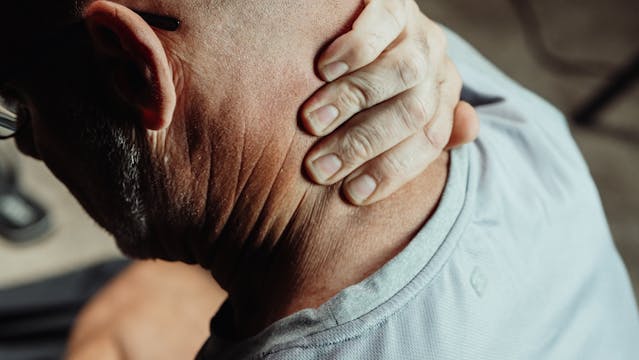Key takeaways
- Quitting smoking may temporarily increase back pain.
- Smoking intensifies pain, worsens spine-related conditions.
- Nicotine withdrawal unmasks pre-existing pain more intensely.
- Back pain linked to smoking may worsen over time.
- Quitting is crucial; circulation improves, preventing further degeneration.
Quitting smoking is can be an extremely challenging process, but it’s one of the best things you can do for your health.
When you quit smoking, your body enters a state of nicotine withdrawal, which can cause an array of unpleasant symptoms.
You might also be wondering, did quitting smoking cause back pain?
It’s highly likely that it did. Pain sensitivity increases once you stop smoking — and it gets even worse during your withdrawal period, the time after you’ve stopped smoking.
Chat to a prescriber
Bulk-billed phone consultations
TGA-authorised clinicians
Nicotine vaping scripts available
As your brain adjusts to a nicotine-free state, you’ll feel pain much more intensely temporarily, and it will dissipate and feel normal over time.
Studies have shown that most successful quitters report higher pain sensitivity than usual during their nicotine withdrawal phase — the phase you’re probably in right now.
Smoking, on the other hand, can actually cause or worsen back pain and the conditions causing it.
In this guide, we explain the relationship between smoking and back pain, and delve into why quitting is the best course of action.
Can Quitting Smoking Cause Back Pain?
If you’re experiencing back pain after smoking, you’re not alone.
In fact, research has shown that smokers are three times more likely to develop chronic back pain than non-smokers.
In fact, smokers with high BMI (those who have higher fat mass in their body) are the ones who feel the pain in their backs the most.
This study found a statistically significant relationship between back pain and smoking, with back pain prevalence among smokers sitting at 28%.
It’s thought that back pain after smoking occurs for a few different reasons.
Does Smoking Make Back Pain Worse?

Smoking can make back pain worse. There are several factors that come into play here.
Smoking and Pain Sensitivity
Smoking helps mask the physical pain in our bodies. Nicotine interferes with our brain’s capacity to regulate pain signals.
Every nicotine hit releases dopamine in our system, which essentially makes us feel good similar to endorphins right after a lengthy jog.
Unfortunately, this pain relief is unsustainable — it’s only short lived. Once the effect of nicotine subsides, the pain in your back and possibly your muscles and joints would come back stronger.
To cope with the pain, you may unconsciously or consciously reach for another cigarette. This is a cycle very common among long-term smokers.
One other thing is that smoking can be the direct cause of increased back pain after you’ve quit the habit. The chemicals in cigarette smoke increases inflammation in the body, which is extremely painful once the pain mask of nicotine is taken off.
Smoking and Blood Flow
Blood circulation is crucial to healing your bones and tissues. Chemicals from cigarette smoke have been proven to cause your blood passages to constrict, limiting the nutrients and oxygen that aid the body’s recovery.
Long-term smokers typically have less dense bone mass due to cigarette smoke. In fact, the spinal discs are the areas hardest hit as they receive the least amount of blood supply when you keep on smoking.
Nicotine, while relatively harmless, also contributes to blood vessel constriction.
The limited amount of blood passage across various parts of the body will also cause long-term damage to the ligaments and muscles surrounding the spine — the probable cause of back pain among those quitting smoking and have high but temporary pain sensitivity.
Smoking and the Spine

Smoking directly impacts the discs within the spine.
Smoking reduces the nutrient exchange between the bone and spinal disc, which causes the disc to break down.
It’s also been proven that the 7,000 chemicals within tobacco can cause damage to the spinal discs and joints within the spine.
The presence of nicotine in particular can decrease the regeneration of cells within the spinal discs. This, combined with the lack of blood flow to the muscles surrounding the spine, can cause increased pain.
Smoking and Healing
If you feel fatigued after quitting smoking, it’s probably due to your body working itself overtime to heal your body.
Chemicals in cigarette smoke weaken the body’s natural immune system. Adding the fact that smoking constricts blood flow in the body, your body will be slow to heal injuries.
For everyone, especially elderly long-term smokers, they increase the likelihood of spinal disk injuries and will likely take a long time to recover from it.
However, spinal problems are just one part of the problem. A weak immune system will expose you to further health complications. You’ll most likely struggle to heal after surgery if you keep on smoking, too.
Your GP might also disqualify you from surgeries that may help with back pain until you’ve quit smoking and your immune system improves. This isn’t an ideal situation as you’ll continue to endure more back pain in the process.
To make matters worse, keeping on smoking will increase your back pain and find no relief for it — smoking has been known to interfere with back pain prescriptions.
Types of Back Pain Affected By Smoking
A number of specific spinal conditions can be caused or worsened by smoking. Smoking can also hinder the success of certain procedures and treatments used to combat back pain.

Degenerative Disc Disease
Smoking has been linked to the development of degenerative disc disease, which is also known as disc dehydration.
Disc degeneration can occur due to the effects of nicotine on the vascular system. The toxic chemicals in tobacco can also cause cellular damage, which leads to disc degeneration.
Osteoporosis
Smoking increases the risk and worsens the symptoms of osteoporosis.
Osteoporosis is a condition that causes the bones to become thin and weak, so much so that they regularly fracture or break.
The condition can occur due to unchangeable factors, such as ageing, as well as lifestyle factors, including tobacco use.
As mentioned, smoking limits the blood and oxygen supply to the bones, which can cause them (the spine in particular) to become thinner, weaker, and more prone to breaks or fractures.
In other words, osteoporosis is more likely to occur in smokers due to the lack of adequate oxygen and blood supply to the bones.
Fibromyalgia
Fibromyalgia is an incurable condition that caused widespread tenderness and pain in the body.
Each patient presenting with the condition will have their own set of symptoms.
A study found that smokers with this condition experienced an increase in the severity of their symptoms, as well as increased anxiety.
Spinal Fusion
Spinal fusion is a surgery that permanently connects two or more vertebrae in the spine. It is used to correct problems in the spine and help relieve the painful symptoms of a number of back and spinal conditions, including degenerative disc disease and scoliosis.
Smoking can delay or prevent successful fusion of the vertabrae and interfere with the healing process post-surgery. In fact, smoking can negatively affect spinal surgeries in general.
Fo this reason, many surgeons require patients to quit smoking before attempting these surgeries.
More About Nicotine Withdrawal

Nicotine withdrawal is a likely culprit for increased back pain after quitting smoking. You may feel stressed and anxious without a cigarette. Combined with your current pain sensitivity, your back pain will surely worsen.
However, know that this is only temporary.
After you’ve stopped smoking, your body’s dependence on nicotine decreases. As a long-term former smoker, you’ve been used to having a regular dose of nicotine. This explains why you always crave another hit of a cigarette and nicotine whenever you have the chance.
Stopping for a few hours already felt uncomfortable. Quitting for a week or two will have your body enter a state of nicotine withdrawal. This is the period when you’ll feel intense cravings, anxiety, irritability, flu-like symptoms, stomach upset, headaches, and increased sensitivity to pain.
As mentioned earlier, nicotine withdrawal removes the pain-altering mask of nicotine. Considering the damage caused by smoking, the pain you feel will surely feel much more severe than usual temporarily.
But, this is still good for you — now, nicotine isn’t tricking your brain and interrupting pain signals.
And there’s more good news: these withdrawal symptoms are only severely intense during the first three days of quitting. Over time, you’ll feel relief from pain, especially once you reach your first month of quitting smoking for good.
It’s important to remember that while quitting can cause a temporary uptick in back pain, this will pass. Back pain caused by smoking, on the other hand, will worsen the longer you continue to smoke.
Will Quitting Smoking Help Back Pain?
The neurological and vascular effects of smoking can be reduced by quitting, but cannot be fully reversed.
Former and current smokers are at an increased risk of developing lower back pain and degenerative disc disease due to smoking.
However, quitting is still the best thing you can do to improve your back pain. Giving up cigarettes can prevent back pain from worsening and can prevent further degeneration from occuring.
When you quit, your circulation, blood flow, and immune system function all improve. All of these factors support spinal health and reduce back pain.
Smoking and Neck Pain

Some smokers experience pain in the right side of the neck after smoking, as well as generalised neck pain.
The cervical spine is the neck region of the spinal bone. It consists of vertebrae with cervical discs in between them that absorb shock sustained by the spine.
Smoking can damage the cervical discs in the neck. These discs naturally become dehydrated and shrink as we age, but smoking accelerates this wear and tear.
This occurs because the nicotine within tobacco increases the risk of microvascular disease, which is disease of the small blood vessels.
The intervertebral discs source nutrition from the microvasculature that lines both sides of the disc. If the blood vessels become injured due to smoking, the discs cannot be nourished properly, which leads to disc degeneration.
A study has shown that current smokers had more severe cervical degenerative disc disease than non-smokers.
Another study found that smoking increases the rate at which the cervical discs degenerate, leading patients to present with more severe neck and shoulder pain.
Quitting Smoking: The Best Thing You Can Do For Your Back Pain

While quitting smoking can cause back pain, this increase in pain is temporary and occurs due to the nicotine withdrawal process.
When you smoked, nicotine triggered the release of dopamine in the brain which masked any pre-existing back pain.
When you quit, your body may experience heightened sensitivity to pain due to the drop-off of nicotine. This will level out within one month of quitting, once your nicotine withdrawal subsides.
Smoking, on the other hand, can actually cause a number of back conditions and significantly worsen back pain and spinal conditions, including degenerative disc disease, osteoporosis, and fibromyalgia.
Smoking also interferes with the body’s ability to heal properly, and for this reason, many surgeons consider smokers ineligible for spinal surgery.
Quitting smoking is the best thing you can do for your back pain. The process can be challenging, but you don’t have to do it alone.
There are a number of smoking cessation pharmacotherapies, strategies, nicotine replacement therapies, and treatments designed to make quitting easier for you.
To know more about it, consider getting help from our content and from a registered GP — we can help you find one who can address your specific needs.
Smokefree Clinic gives you access to many medically reviewed and trustworthy resources that can inform and aid you in your path to wellness, so have a look around!
If you’re ready to get started, Smokefree can connect you to friendly Australian healthcare professionals who excel in helping patients quit smoking for good, including via the use of pharmacy NVPs.
Click here to book in with a doctor today.
Link Reference:
- https://www.ncbi.nlm.nih.gov/pmc/articles/PMC9666296/
- https://news.northwestern.edu/stories/2014/11/smoking-is-a-pain-in-the-back/
- https://www.ncbi.nlm.nih.gov/books/NBK538173/
- https://www.ncbi.nlm.nih.gov/pmc/articles/PMC5081254/
- https://www.ncbi.nlm.nih.gov/pmc/articles/PMC9560562/
- https://www.ncbi.nlm.nih.gov/pmc/articles/PMC10651227/
- https://www.sciencedirect.com/science/article/pii/S1878875023011828
- https://www.ncbi.nlm.nih.gov/pmc/articles/PMC6408684/
- https://www.sciencedirect.com/science/article/pii/S1743919118306836

